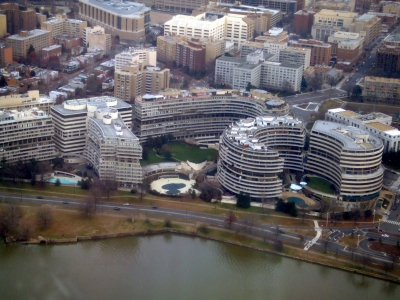Leonidas "Leon" Jaworski (September 19, 1905 December 9, 1982) was an American attorney and law professor who served as the second special prosecutor during the Watergate Scandal. He was appointed to that position on November 1, 1973, soon after the Saturday Night Massacre of October 1920, 1973, which included the dismissal of his predecessor Archibald Cox.
The Watergate scandal was a major political scandal in the United States involving the administration of U.S. President Richard Nixon from 1972 to 1974 that led to Nixon's resignation. The scandal stemmed from the Nixon administration's continual attempts to cover up its involvement in the June 17, 1972, break-in of the Democratic National Committee headquarters at the Washington, D.C. Watergate Office Building. After the five perpetrators were arrested, the press and the U.S. Justice Department connected the cash found on them at the time to the Nixon re-election campaign committee. Further investigations, along with revelations during subsequent trials of the burglars, led the U.S. House of Representatives to grant its judiciary committee additional investigation authority to probe into "certain matters within its jurisdiction", and the U.S. Senate to create a special investigative committee. The resulting Senate Watergate hearings were broadcast "gavel-to-gavel" nationwide by PBS and aroused public interest. Witnesses testified that Nixon had approved plans to cover up administration involvement in the break-in, and that there was a voice-activated taping system in the Oval Office. Throughout the investigation, the administration resisted its probes, which led to a constitutional crisis.Several major revelations and egregious presidential action against the investigation later in 1973 prompted the House to commence an impeachment process against Nixon. The U.S. Supreme Court ruled that Nixon had to release the Oval Office tapes to government investigators. The tapes revealed that Nixon had conspired to cover up activities that took place after the break-in and later tried to use federal officials to deflect the investigation. The House Judiciary Committee approved three articles of impeachment against Nixon for obstruction of justice, abuse of power, and contempt of Congress. With his complicity in the cover-up made public and his political support completely eroded, Nixon resigned from office on August 9, 1974. It is believed that, if he had not done so, he would have been impeached by the House and removed from office by a trial in the Senate. He is the only U.S. president to have resigned from office. On September 8, 1974, Nixon's successor, Gerald Ford, pardoned him.
There were 69 people indicted and 48 people—many of them top Nixon administration officials—convicted. The metonym 'Watergate' came to encompass an array of clandestine and often illegal activities undertaken by members of the Nixon administration, including bugging the offices of political opponents and people of whom Nixon or his officials were suspicious; ordering investigations of activist groups and political figures; and using the Federal Bureau of Investigation, the Central Intelligence Agency, and the Internal Revenue Service as political weapons. The use of the suffix "-gate" after an identifying term has since become synonymous with public scandal, especially political scandal.

1973Nov, 1
Watergate scandal: Leon Jaworski is appointed as the new Watergate Special Prosecutor.
Choose Another Date
Events on 1973
- 20Jul
Bruce Lee
Bruce Lee, the famous Chinese actor and martial-arts expert, dies in Los Angeles at age 32 from a brain edema possibly caused by a reaction to a prescription painkiller. - 15Aug
Cambodia
Vietnam War: The United States bombing of Cambodia ends. - 22Aug
Salvador Allende
The Congress of Chile votes in favour of a resolution condemning President Salvador Allende's government and demands that he resign or else be unseated through force and new elections. - 17Oct
1973 oil crisis
OPEC imposes an oil embargo against a number of Western countries, considered to have helped Israel in its war against Egypt and Syria. - 4Nov
1973 oil crisis
The Netherlands experiences the first Car-Free Sunday caused by the 1973 oil crisis. Highways are used only by cyclists and roller skaters.

 English
English  español
español  français
français  português
português  русский
русский  العربية
العربية  简体中文
简体中文 